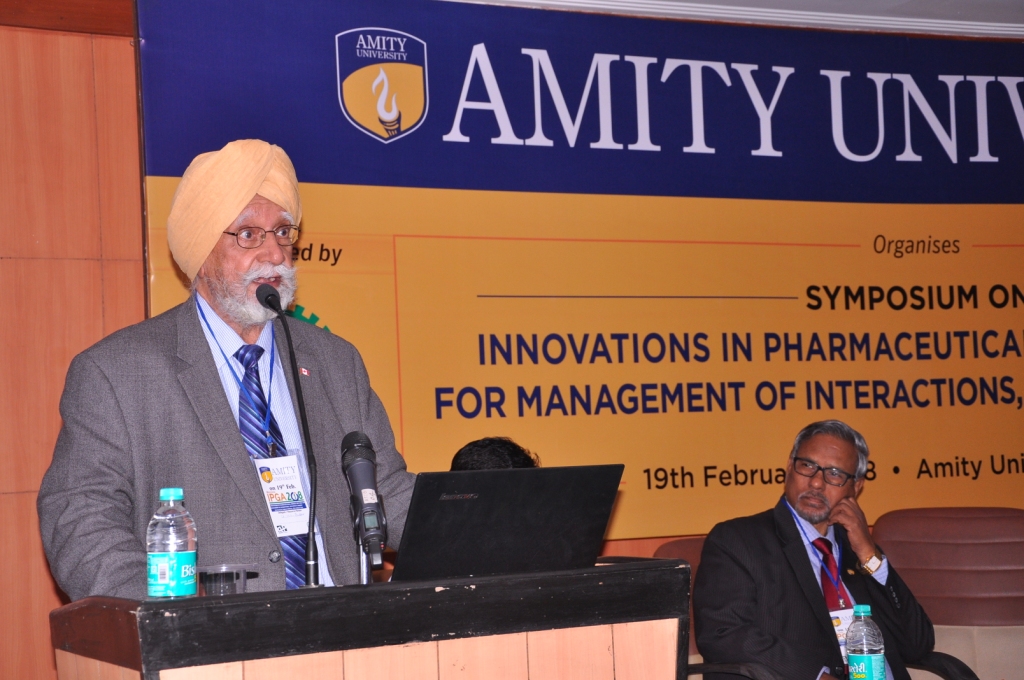Government should come up with good quality control measures for the production of Herbal Medicines in India
Noida: Amity Institute of Pharmacy (AIP), under the Domain of Health & Allied Sciences of Amity University organized a Symposium on ‘Innovations in Pharmaceuticals, Herbals and CAMs for management of Interactions, side effects thereof” in association with Indian Pharmacy Graduates’ Association (IPGA) at University Campus, Sector-125, Noida
Welcoming the gathering, Prof. B.C. Das, Dean, Health and Allied Sciences, Amity University, Noida stated that the theme of the Symposium is very timely and important since India, being a storehouse of herbal products and concoctions, a lot of Research and Innovation has been going on in the area of Herbal products. Raising his concern at the same time, he stressed that there are no molecular and clinical analysis done on herbal medicines and implored that the curative or side effects of the same need to be evaluated thoroughly. He expressed his hope that the discussions and deliberations of the Symposium will address various concerns associated with Herbal medicines.
The event commenced with Invited Talks by eminent and experienced Speakers from Delhi-NCR including Prof. Dr. Uttam Chand Banerjee, Ph.D.-Professor and Head, Department of Pharmaceutical Technology, National Institute of Pharmaceutical Education and Research (NIPER), Punjab; Prof. Dr. Harpal S. Buttar-Adjunct Professor, Department of Pathology & Laboratory Medicine, University of Ottawa, Faculty of Medicine, Ottawa, Ontario, Canada; Dr. N. Srikanth M.D. (Ayurveda)-Deputy Director General, AYUSH and Dr. Anil Kanaujia, Head- R&D Centre, Ayurvet Research Foundation, Chidana, Sonipat, Haryana.
Sharing his views, Prof. Dr. Harpal S. Buttar-Adjunct Professor, Department of Pathology & Laboratory Medicine, University of Ottawa, Faculty of Medicine, Ottawa, Ontario, Canada shared that plants can produce very simple and complex molecules, which could be used to treat diseases but advised that caution needs to be exercised while using herbal medicines along with allopathic medicines. Elaborating on the myth associated with herbal remedies, he stressed that people think that herbal medicines are natural and therefore, free from harmful effects of drugs. Adding to the prevalent myth, he stressed are, growing reverence for nature and changing attitudes towards self-medication. Outlining the likely side effects associated with herbal medicines, he remarked that in some cases herbal medicines can cause allergic reactions, dizziness, cardio-vascular diseases, insomnia, bleeding etc. He stressed that combining Herbal Medicines with Allopathic medicines can cause addictive, synergistic or antagonistic effects on human bodies and the toxic effects may not be visible immediately and may take 3-4 months to become evident. He suggested that Government of India, keeping in view the side effects associated with Herbal medicines, should come up with good quality control measures for the production of Herbal Medicines in India
Sharing his views on “Innovations in Pharmaceuticals, Herbals, Complementary and Alternative Medicines”, Dr. Anil Kanaujia, Head- R&D Centre, Ayurvet Research Foundation, Chidana, Sonipat, Haryana averred that big companies are continuously doing Research to find out new molecules for treating diseases which is time consuming (may take 8-10 years), expensive and requires cross functional teams to work together. He remarked that in Pharmaceutical Industry, the quality, safety and efficacy of drugs are thoroughly tested, before the medicine comes out in the market. Comparing the Pharmaceutical Industry with Herbal Medicines Industry in India, Dr. Kanojia stated that there is lot of work going on in Indian Herbal Industry and most of the good players are following WHO guidelines for quality, safety and efficacy of even herbal medicines. He remarked that the major problems faced in Herbal Industry is the availability of authentic raw material and suggested that the standardization of herbal formulation is important before it is launched in market. He stressed that though Herbal Drug Industry in India is working on quality, safety and efficacy of the herbal medicines but effects of their interaction with Allopathic or Synthetic medicines is still lacking in India
Also present during the occasion were Dr. Naval Kumar Verma, Advisor, Ministry of AYUSH, Govt. of India and Dr. W Selvamurthy- President, Amity Science Technology and Innovation Foundation
Over 100 researchers and students from Sympathy Institute of Homoeopathy, Badarpur, IMT College of Pharmacy, Greater Noida and Amity Institute of Pharmacy attended the Symposium.

